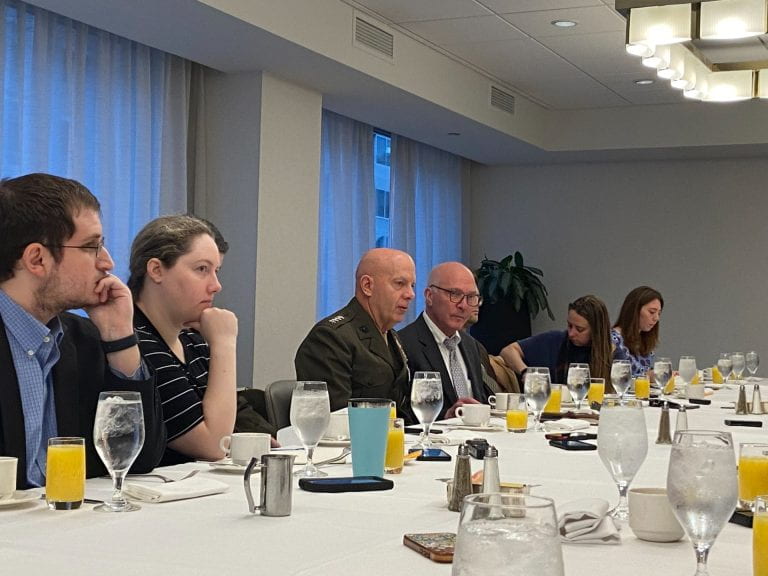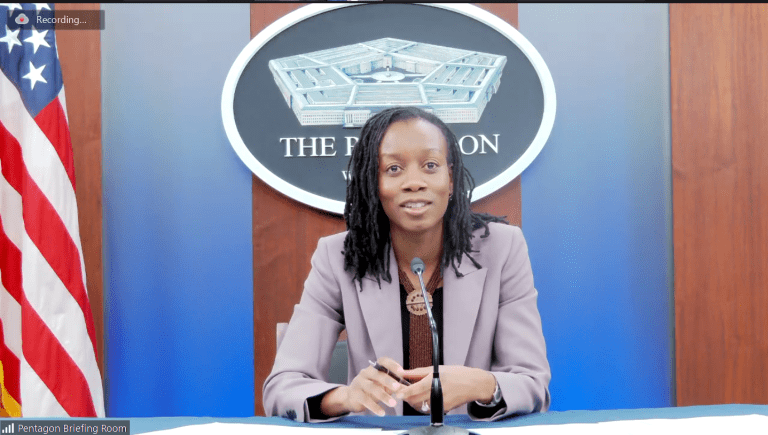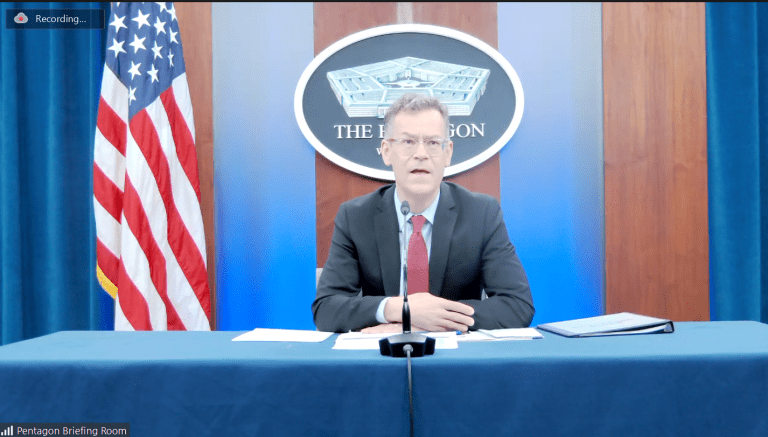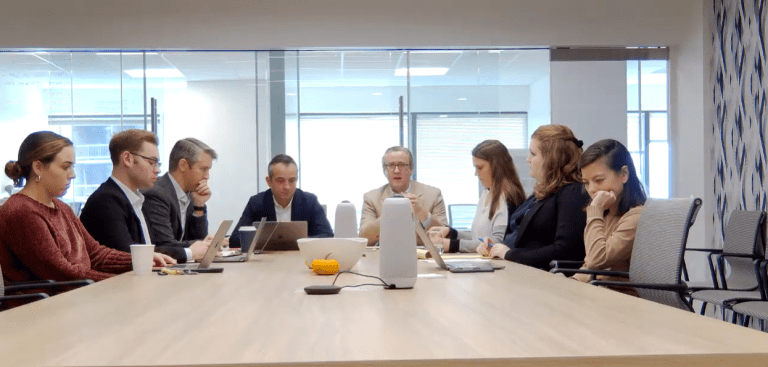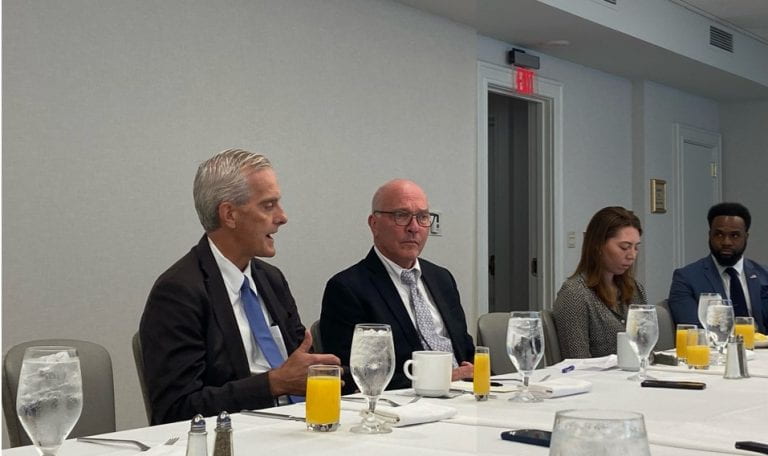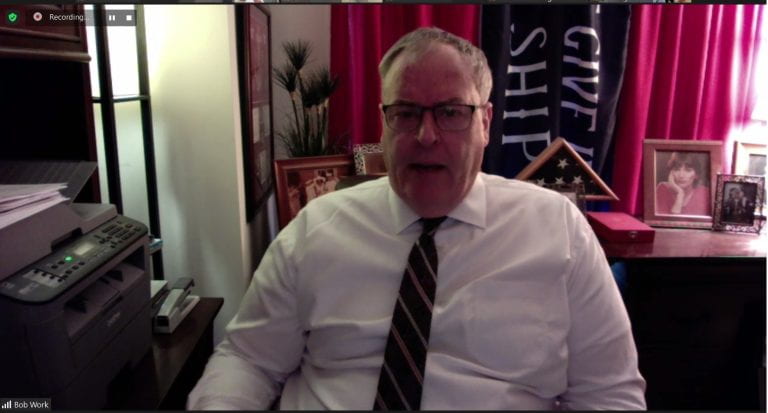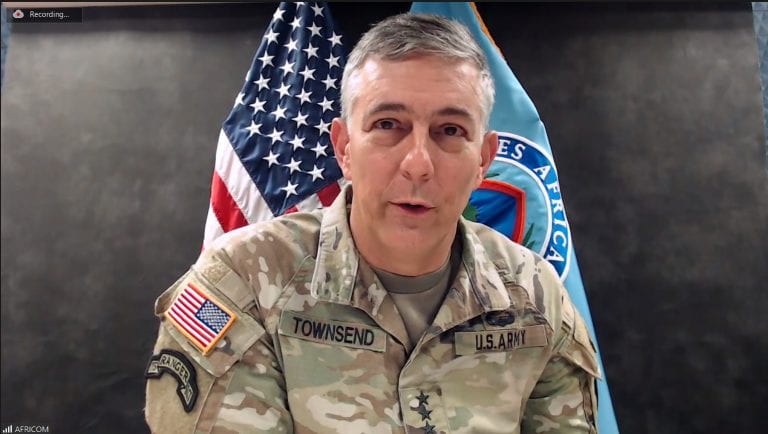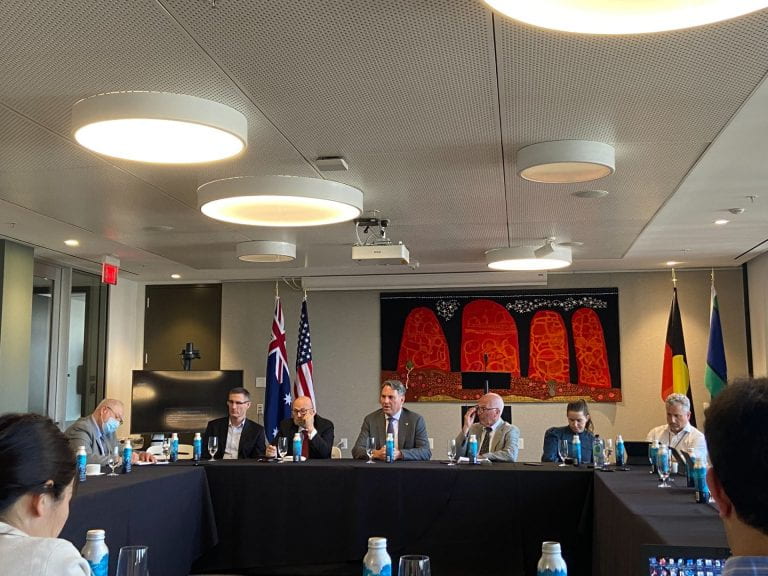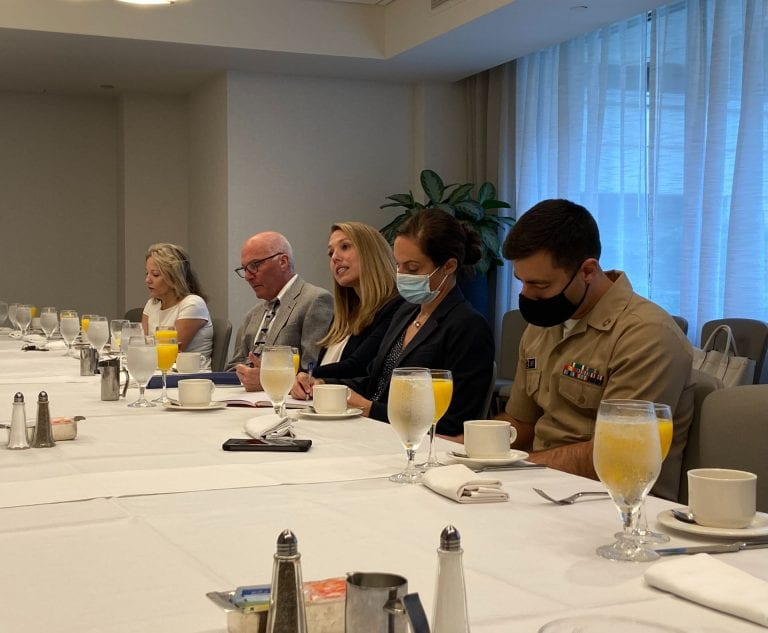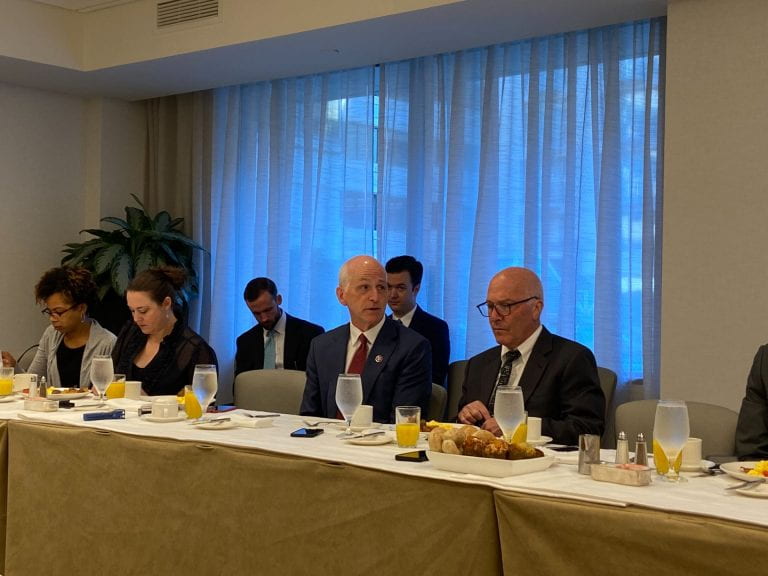Defense Writers Group
7 December 2022
Moderator: Good morning everyone and welcome to this Defense Writers Group with General David H. Berger, Commandant, United States Marine Corps. General, we’re honored by your presence at such a busy and dramatic time.
The ground rules, as always, this is on the record. You can record it for accuracy and quotes but nothing may be rebroadcast, either audio or video. I’ll ask the first question then we’ll move around the room. Almost a dozen of you emailed in advance to be on the list, but we’ll get to as many of you as we possibly can. I’ll save a few minutes at the end for General Berger to wrap up with any concluding thoughts.
Sir, you’ve embarked on dramatic, even historic changes in how the Marines are equipped, prepared to fight, including how and where they are postured and deployed. Give us a little bit of the underlying rationale for force design and my question for you, sir, is what do you see in the world of risk that your very vocal critics do not?
General Berger: Great question. I’ll answer the very back part first very quickly. I think if they were sitting here, the critics, they would probably see the risks not any different than me. They have a disagreement about the process or the solution but not a lot of difference on how they see the threats. The execution of it, we have a lot of discussion about.
6 December 2022
Defense Writers Group
Moderator: Good morning, and welcome to this Defense Writers Group with Chidi Blyden, the Deputy Assistant Secretary of Defense for African Affairs. I believe, ma’am, this is your first meeting with the Defense Writers Group so we are very honored by your presence here today.
Just a quick repetition of the ground rules that you all know. This discussion is on the record but there is no rebroadcast of audio or video. I’ll ask the first question then go around the room for the rest of the hour, reserving a few minutes at the end for DASD Blyden. But a half dozen of you have already asked in advance to be on the questioner’s list. If anybody else wants to ask a question, please drop me a note in the direct chat, not the group chatline there.
Again, Madame Secretary, thank you for joining us today.
The first question is sort of the background. The National Defense Strategy and the White House Sub-Saharan Africa Strategy outline a new approach to Africa. Can you describe a little bit what this new approach is all about, what is the US intent for adopting this new approach and hoping for a little news here, Madame Secretary. What goals does the US have for President Biden’s convening of the African Leaders Summit next week? Over to you, ma’am.
DASD Blyden: Thom, thank you so much for having me join this illustrious group, and I appreciate the opportunity to share a little bit about the new approach, as well as the Africa Leaders Summit that will kick off early next week.
8 November 2022
Defense Writers Group
Moderator: Welcome everyone. I’m Thom Shanker, Director of the Project for Media and National Security. Welcome to this Defense Writers Group with Dr. Colin Kahl, the Under Secretary of Defense for Policy. I was telling Dr. Kahl as we came on that we have almost 50 RSVPs which makes this likely the largest Defense Writers Group in history which shows the great interest in the topics that Dr. Kahl is here to discuss with us and his expertise.
As always the ground rules, this will be on the record, but there is no rebroadcast of audio or video. I’ll ask the first question, then we’ll go around the room. Quite a few of you emailed in advance to get on the list. I’ll call on those first. And if there’s time afterwards, I’ll get to others. If you do want to be on the list of questioners, please drop me a note in the direct chat, not the group chat. And of course I’ll save a minute or two at the end for our distinguished guest to wrap up.
Dr. Kahl, again, welcome. I know your schedule is busy. We’re honored to have you with us today.
Dr. Kahl: It’s great to be with you.
26 October 2022
Cyber Media Forum
Moderator: We’re responding to the overwhelming interest in your work and the attendance for the recent session with Eric Schmidt and Bob Work set a record for our organization, so we are honored to have you back to discuss your next two reports.
The one on Intelligence in an Age of Data Driven Competition; and then, of course, The Future of Conflict and the New Requirements of Defense.
I’d like to thank the Howard Baker Forum and DXE Technology for their support of everything that we do. Also a very special thanks to Tara Rigler, someone I worked with for 20 years and who used to be the gold standard of communications, and it’s just great to be working with her again.
I see most of the people around the table. I know Ylber who is the Senior Advisor for Defense and Intelligence; Justin Lynch who’s the Senior Director for Defense; Peter Mattis is your Director of Research Analysis for Intelligence; and Luke Vannurden is the Associate Director for Defense at the Special Competitive Studies Project.
While normally we jump right into Q&A, I think it would be valuable since your reports are so thorough and so deep, I’ve actually read every word but can’t say I’m fluent. In fact I’d ask you for just a quick sort of top line/bottom line, what you think the most important points are, and then we’ll jump into a discussion.
Mr. Bajraktari: Good morning, everyone. Good morning, Thom. Thank you very much for having us today and for the opportunity to have this discussion, as well as the discussion in-house previously with Dr. Schmidt and Bob Work and our ARCEO and for your many years of excellent reporting at the Pentagon where I had the privilege of spending 13 years and we’re often learning from your writings about what was happening in the building. So I really appreciate the opportunity to have this conversation.
26 September 2022
Defense Writers Group
Moderator: Good morning everyone, and welcome to this Defense Writers Group with Denis McDonough, the Secretary of Veterans Affairs. We have a bit of a smaller group than usual because of the holidays, but that means more questions for everybody.
As always we’ll be on the record, but there is no rebroadcast of audio or video. I’ll ask the first questions, then a couple of you emailed me in advance to ask, but we’ll go around the table, and then we’ll give the Secretary a few minutes at the end for some closing comments.
Mr. Secretary, thanks for being here.
Secretary McDonough: It’s nice to see you, Thom. It’s really nice to catch up. It’s been too long.
12 September 2022
Cyber Media Forum
Moderator: Good morning everyone and welcome to this Cyber Media Forum with Eric Schmidt and Robert Work who chair the Special Competitive Studies Project. This is their first public discussion with correspondents on their findings and recommendations. The report was just released today on how to strengthen America’s long term competitiveness in a future where AI and other cyber technologies reshape our national security.
Two quick words of thanks, if I might. First to Tara Rigler who handles media for SCSP. She’s been a fabulous wingman in arranging this session and some of the logistical complications that will become apparent in a moment. And also a most heartfelt thanks to the Howard Baker Forum and DXC Technology for their continued support of our work in the Cyber Media Forum.
The ground rules, as always this is on the record, but there is no rebroadcast of audio or video. A few questioners have already emailed me to get on the list. I’ll ask the first question, I’ll go through those. If anybody else wants to get on the list of questions send me a note in direct chat, not group chat, but directly. We’ll get through as many as we can in the hour.
Mr. Work is on the line right now. Dr. Schmidt, I’ve been allowed to tell you, is just exiting Ukraine where he has made a private secret trip. He got to a European country and is airborne now and will be dialing in momentarily. So until he joins us, Bob Work, welcome. Thanks so much for your time, sir.
Mr. Work: Thank you, Thom. And welcome to everybody who’s here today. Thank you for joining us.
28 July 2022
Defense Writers Group
Moderator: Good morning, everyone, and welcome to this Defense Writers Group with General Stephen Townsend, Commander of US Africa Command. This is actually one of our largest turnouts ever, so it shows the great interest in the topic and of course the convenience of meeting on Zoom from time to time.
Our ground rules, as always, this conversation is on the record, but there is no rebroadcast of either audio or video. As is our custom, I’ll ask the first question and then I’ll go to the floor. About a half dozen of you emailed me in advance to get on the questioners list. If you do want to ask a question you can drop me a note in the direct chat.
With that, General, we are honored by your presence. Thank you so much for joining us today.
General Townsend: Thanks, Thom, it’s great to be here with all of you. And let me just say to the whole group, I really actually appreciate what you’re all doing out there. I actually believe in the importance of a free press and a free society and the ability to shine a spotlight on all that we’re doing, even while you’re filing your fingernails.
14 July 2022
Defense Writers Group
Moderator: Greetings and welcome everyone to this Defense Writers Group conversation with Australia’s Deputy Prime Minister and Defense Minister Richard Marles. You must be a very busy man with those two jobs. I understand that happy birthday wishes are in order for yesterday, sir.
Minister Marles: I’m in denial, but yes.
Moderator: Many, many happy returns.
Minister Marles: Thank you.
Defense Writers Group
June 21, 2022
Moderator: Good afternoon and welcome. I’m Thom Shanker. I’m the Director of the Project for Media and National Security at George Washington University. I welcome all of you to this Defense Writers Group. We’re honored to have Meredith A. Berger who has just corrected me. She has one title now, not two. She is the Assistant Secretary of the Navy for Energy, Installations and Environment. It sounds to me like more than enough to do during the day.
The ground rules are this is on the record, but nothing is for rebroadcast -- audio or video. Please record it for your own accuracy. I’ll ask the first question, and then some of you emailed in advance to get on the questioners list. We’ll go around the table. And others who aren’t on the list, of course, there will be time for you, and then a few minutes before the hour I’ll ask Ms. Berger to wrap up.
Thank you so much for being here. This topic is absolutely -- I don’t want to say I’m obsessed with climate and national security but being a very traditional national security guy from 9/11 onward, I find this topic very, very important. So can you talk a little bit about how the Navy sees climate change as increasing risk globally? And the second part, how does climate change make executing on the Navy mission harder?
A/S Berger: Sure. Thank you for the kind invitation. It’s nice to spend time with all of you. I think often it’s voices, so it’s nice to see faces.
Defense Writers Group
June 15, 2022
Moderator: Good morning, everyone, and welcome to the Defense Writers Group breakfast with Representative Adam Smith, Chairman of the House Armed Services Committee. Sir, we’re honored to have you. As I mentioned, there’s such great interest in these topics.
As always, our discussion is on the record, but there’s no rebroadcast of audio or video. I’ll ask the first question and then of course we’ll go to the room. Almost a dozen of you emailed me in advance. If we get through this list, we will of course get to others.
Mr. Chairman, the timing of our meeting is especially important right now. Ukraine’s on the top of everyone’s mind. The SecDef just returned from Asia. He’s in Brussels soon for talks about Ukraine. All of these highlight a range of important national security concerns.
As you’re looking at the budget proposal, what risks are being assigned the highest priority and does the budget do it well in your mind? And sort of the other half of that, Mr. Chairman, is where might the President’s budget request fall short and fail to properly address threats that you see as significant?
Mr. Smith: I think it’s a reasonable balance. And the problem always is, it’s a very slippery slope to a premise that says -- well, I think of a Member who shall remain nameless asking Secretary Gates, and Gates said, you know, he went through the whole our budget manages risk, here’s the risk we’re managing, you know. The basic analysis that you sort of just went through. And the Member said, now Secretary Gates, I don’t think that’s your job. You need to give us a budget that has no risk. I literally snorted in laughter at the question, and they went back and forth with that for a while and Secretary Gates finally said, I’m sorry, Congressman, we don’t live in that world. Okay? We’re managing risk. I think that’s where you can sort of run headlong into a lot of paranoia about what can happen and what you really need to be prepared for.

